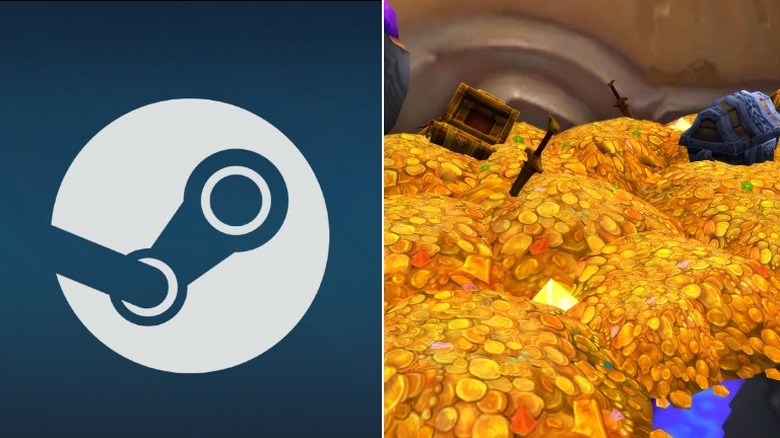We Finally Know What Inspired The Steam Workshop
Through the Steam Workshop, players have been able to tweak and transform their favorite games in a myriad of ways, as well as share their creations with the rest of the community. Steam Workshop users have added new levels, characters, power-ups, and even all-new fan-created chapters to their favorite titles. Think of it as fan fiction on a massively interactive scale. Users can share their fun mods and new modes with their followers or simply keep a record of the progress of their build.
In a recent interview with gaming magazine Edge (via PCGamesN), Valve CEO Gabe Newell explained where he and his team got the initial idea that became the Steam Workshop. It's probably not what you expect, proving that inspiration comes from the strangest places.
"We were always used to thinking about games as entertainment experiences, but then we started thinking of them as productivity platforms. As a sort of proof-of-concept I decided to be a gold farmer in World of Warcraft for a while."
As Newell explained to Edge, he quickly began making upwards of $20 an hour through farming for gold in World of Warcraft. For those who may be unfamiliar with the concept, "gold farmers" spend the majority of their time in World of Warcraft collecting and hoarding loot that can then be resold to other players for real-world money. It's become quite a lucrative practice for some hardcore WoW players, Newell apparently included.
Recognizing that this was bringing him more income than most regular jobs would (especially those paying minimum wage), Newell decided to further develop the plan. This seed eventually became the Steam Workshop.
Newell continued with his story by explaining how the Steam Workshop first launched as a platform for players who wanted to share Team Fortress 2 custom items. This also presented some unique challenges, particularly since there wasn't anything else quite like the Steam Workshop around that time. It raised some concerns for some parents who didn't quite understand what their kids were getting into.
As Newell tells it, "[We were] trying to think of everybody as a content creator. There's this story of the parents that called us up because they thought we were selling their kid drugs. What happened was PayPal pinged the parents and said, 'Your kid is exceeding our limits on how much money they can put into PayPal per month. They're probably selling stolen goods or drugs, because there's no other explanation.'"
Naturally, this concerned several parents, who then contacted Valve to find out what the heck was going on. In a conversation that sounds like it would have been amazing to listen in on, Newell calmly explained to them that their kids were not drug dealers/buyers at all, and that Valve wasn't helping to raise the next generation of Scarfaces.
"So the parents called us up and I said: 'He makes items on the Team Fortress Workshop. He's making $500,000 a year," said Newell. "That to us was an indication that this was a helpful way of thinking of games – as platforms – and it's informed all of our decisions about multiplayer games subsequently."
After this served as a clear example of the idea being successful, Valve expanded their efforts with the Steam Workshop. The Workshop now offers support of some kind for just about every game on Steam.
Gabe Newell and company have always been forward-thinking when it comes to the intersection between gamers and technology. Just recently, Newell told IGN that he's been working on various applications that may be bringing gamers closer to the kind of tech seen in films like The Matrix.
As Newell told IGN at the time, "The area that I'm spending a lot of time on has been growing out of a bunch of research that occurred a while ago on brain-computer interfaces ... We're way closer to The Matrix than people realize ... it's going to have a huge impact on the kinds of experiences we can create for people ... We're going to learn a lot as we proceed as to what things work and what things don't, what things are valuable to people and what things are party tricks that don't really matter in the long run."
There's a lot of trial and error involved when changing the landscape of gaming, but Newell and Valve seem to be consistently up to the task. The Steam Workshop is a prime example of this kind of forward momentum. And to think, it all started with the same action that so many gamers are familiar with: grinding for gold.

